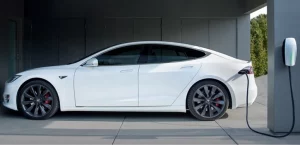Installing a home EV charger requires careful consideration of your electrical system. A professional electrician plays a crucial role in ensuring safety and compliance with local codes. They can evaluate your home’s capacity and suggest necessary upgrades. Recognizing when to seek expert assistance is essential. Various factors can indicate the need for a professional, and understanding these can help avoid future complications. What should homeowners look for in this process?
Key Takeaways
- Evaluate your home’s electrical system; outdated panels may not support the load of an EV charger, necessitating a professional assessment.
- If you experience frequent circuit breaker trips or flickering lights, consult an electrician to address potential wiring issues.
- Unusual smells, such as burning or melting plastic, signal immediate electrical problems, requiring professional intervention for safety.
- Ensure compliance with local electrical codes; if you’re unsure, hiring an electrician will guarantee adherence to regulations.
- An electrician provides expertise in selecting the right charger and ensuring efficient, safe installation for your specific vehicle needs.
Understanding the Basics of EV Charger Installation
When considering the installation of an electric vehicle (EV) charger at home, it is vital to understand the foundational aspects of the process. This includes recognizing the various types of chargers available, such as Level 1 and Level 2, each providing different charging speeds and requirements. Homeowners should also be aware of the location for installation, making sure it is convenient and accessible for the vehicle. Additionally, understanding the compatibility of the charger with the vehicle model is critical. Evaluating the existing electrical infrastructure is another important consideration, as this can influence the installation process. Ultimately, homeowners may wonder, “Do you need an electrician for EV charger installation?” Consulting a professional can guarantee compliance with safety regulations and optimize efficiency.
Assessing Your Home’s Electrical System
Evaluating the home’s electrical system is a key step in preparing for the installation of an EV charger. Homeowners should begin by examining the age and capacity of their existing electrical panel, as it must support the additional load of an EV charger. Checking for adequate circuit breakers and proper wiring is essential to guarantee safety and efficiency. Additionally, understanding the total amperage available in the home can help determine if upgrades are necessary. It is crucial to take into account the distance from the electrical panel to the desired charging location, as this may influence installation costs. By thoroughly evaluating these factors, homeowners can better inform their decision regarding whether they need an electrician for EV charger installation.
The Role of an Electrician in EV Charger Installation
Hiring a qualified electrician is crucial for the successful installation of a home EV charger, as their expertise guarantees the process adheres to safety standards and regulatory requirements. Electricians assess the existing electrical system to determine if it can support the additional load of an EV charger. They also confirm that wiring and circuit breakers are correctly installed and up to code, reducing the risk of electrical fires or malfunctions. Moreover, electricians can advise homeowners on the best location for the charger, considering accessibility and convenience. Ultimately, employing a professional helps to make certain that the installation is efficient and safe, making it clear that, yes, do you need an electrician for EV charger installation, the answer is certainly affirmative.
Signs You Need a Professional Electrician
Recognizing the signs that indicate the need for a professional electrician is vital for homeowners considering the installation of an EV charger. One clear sign is outdated electrical systems that may not support the additional load of an EV charger. Frequent circuit breaker trips or flickering lights can also signal underlying electrical issues requiring expert attention. Moreover, if homeowners notice unusual smells, such as burning or melting plastic, it’s imperative to seek professional help immediately. Additionally, any uncertainty regarding the local electrical code compliance or proper installation techniques warrants consultation with a licensed electrician. Ultimately, understanding these signs helps guarantee safety and functionality, prompting the essential question: Do you need an electrician for EV charger installation?
Benefits of Hiring an Electrician for Your EV Charger Setup
Why navigate the complexities of EV charger installation alone when hiring a professional electrician can guarantee a seamless setup? Engaging an electrician guarantees compliance with local codes and safety standards, minimizing the risk of hazards. These professionals possess the expertise to evaluate electrical systems, determining the best location and installation techniques for the charger. In addition, they can recommend the most suitable equipment for the homeowner’s vehicle and energy needs. This not only enhances efficiency but also prolongs the lifespan of the charger. Moreover, hiring an electrician alleviates concerns related to warranties and insurance, providing peace of mind. For those asking, “Do you need an electrician for EV charger installation?” the answer is clear: professional assistance is invaluable.
Frequently Asked Questions
Can I Install an EV Charger Without Electrical Experience?
Individuals lacking electrical experience should avoid installing an EV charger independently. Professional electricians possess the necessary skills and knowledge to guarantee safe and compliant installation, which is vital for the overall functionality and safety of the system.
How Long Does EV Charger Installation Typically Take?
EV charger installation typically takes between four to eight hours, depending on the complexity of the electrical system and the specific requirements of the charger. Factors such as permits and site preparation can also influence the duration.
What Permits Are Required for EV Charger Installation?
When installing an EV charger, specific permits are often required, varying by location. This typically includes electrical permits, and sometimes building permits, ensuring compliance with local regulations and safety standards for electrical installations.
Are There Specific Brands of EV Chargers You Recommend?
When considering EV charger brands, popular recommendations include ChargePoint, Blink, and Tesla. Each offers various features tailored to different needs, ensuring compatibility and reliability for users aiming to enhance their electric vehicle charging experience.
Will Installing an EV Charger Increase My Home Insurance Costs?
Installing an EV charger may lead to increased home insurance costs, as insurers often view it as a valuable addition. Homeowners should consult their insurance providers for specific impacts based on coverage and location.
Conclusion
In summary, enlisting the expertise of a professional electrician for home EV charger installation is essential for safety and compliance. An electrician’s assessment of your electrical system guarantees it can support the charger’s demands while addressing any potential issues. Recognizing signs that indicate the need for professional help can prevent costly complications. Ultimately, hiring a qualified electrician not only enhances the efficiency and longevity of your EV charger but also provides peace of mind regarding warranty and insurance matters.
You may also like to read:
